Prisons have become a fragile link in many criminal justice systems, weakened by over-incarceration, overcrowding, poor conditions and chronic neglect – fuelling calls for urgent reform.
A decade ago, the UN General Assembly adopted the Nelson Mandela Rules — a set of 122 guidelines setting minimum standards for the treatment of prisoners, inspired by one of the world’s most influential former political prisoners – the South African civil rights icon, Nelson Mandela.
These rules aim to ensure safety, security and respect for human dignity, offering clear benchmarks for prison staff.
Despite this, prison systems worldwide continue to face deep-rooted challenges. The General Assembly convened on Friday to discuss how to better protect societies from crime by focusing on rehabilitation and preparing inmates for life after prison.



Almost like prison is not a good way to deal with most crime.
By default property crimes should be dealt with by full confiscation of stolen property and 6 months of community service (or prison if the convicted so chooses). Each time they do it. With full effort of police to resolve every single case and express trials. No sentencing to harsh penalties as a deterrence, just a 99% chance you’ll be caught.
Isolated cases of violence, like a bar fight etc. Some counseling and community service again.
Consistently violent people are a different story. Say murders or multiple assaults. They should be kept locked indefinitely with annual review, until they pass some test to determine they are unlikely to be violent again.